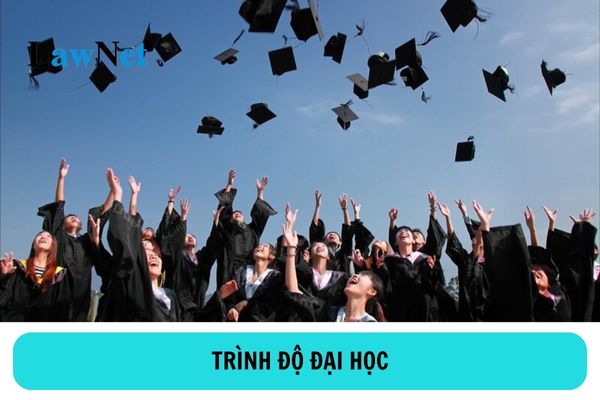What are the specific objectives of higher education in Vietnam?
What are the specific objectives of higher education in Vietnam?
According to point b, clause 1, Article 5 of the Higher Education Law 2012, which contents have been repealed by point a, clause 2, clause 3, Article 77 of the Vocational Education Law 2014, the specific objectives of higher education are to equip students with comprehensive professional knowledge, a solid understanding of natural and social principles and laws, basic practical skills, and the ability to work independently, creatively, and solve issues within the trained discipline.

What are the specific objectives of higher education in Vietnam? (Image from the Internet)
What are the entry requirements for higher education programs in Vietnam?
According to clause 2, Article 6 of Circular 17/2021/TT-BGDDT:
Entry Requirements for Training Programs
- The entry requirements for training programs must clearly specify the minimum requirements for levels, competencies, and relevant experiences suitable for each level, discipline, and training orientation that learners need to meet to successfully study and complete the training program.
2. Entry requirements for higher education programs and specific specialized programs at level 7: Learners must complete upper secondary school or have equivalent qualifications.
Entry requirements for master's training programs: Learners must complete higher education (or equivalent and higher) in a relevant field; have a foreign language proficiency level 3 according to the 6-level Foreign Language Proficiency Framework for Vietnam or equivalent. For research-oriented master's training programs, learners must complete higher education with a good grade or higher or have scientific publications related to the field of study.
Entry requirements for doctoral training programs: Learners must complete a master's program or specific specialized programs at level 7 in a relevant field or graduate with distinction at the undergraduate level (or equivalent or higher) in a relevant field; have a foreign language proficiency level 4 according to the 6-level Foreign Language Proficiency Framework for Vietnam (or equivalent or higher); have research competence and experience.
Thus, the entry requirements for higher education programs are that learners must complete upper secondary school or have equivalent qualifications.
What are the requirements for the learning outcomes of higher education programs in Vietnam?
According to Article 5 of Circular 17/2021/TT-BGDDT, the learning outcomes of higher education programs must meet the following requirements:
- Must be clear and practical, reflecting the learning results that graduates need to achieve in terms of general understanding and core competencies at the training level, and specific requirements of the field and training discipline.
- Must be measurable and assessable according to cognitive levels, serving as the basis for designing, implementing, and improving content and teaching methods; testing, evaluating learning outcomes, and awarding degrees to learners.
- Must be consistent with the program's objectives, showing clear contributions and reflecting the highly representative requirements of employers and other stakeholders.
- Must clearly specify the specific level and meet the learning outcomes for knowledge, skills, autonomy and responsibility, and necessary competencies according to the regulations for the corresponding level in the Vietnam National Qualifications Framework.
- Must ensure connectivity with the entry requirements for higher-level training (if any), while creating opportunities for horizontal transfers between programs at the same training level, especially between programs in the same field or group of disciplines.
- Must be fully and clearly specified in the learning outcomes of the courses and elements in the training program, while being systematically implemented through the connection between courses and elements.
- Must ensure feasibility, suitability with the program's volume so that most learners who meet the entry requirements can complete the training program within the standard time.
What is the minimum credit load for a higher education program in Vietnam?
According to point a, clause 2, Article 7 of Circular 17/2021/TT-BGDDT:
Study Load
- The study load of a training program, of each component, or course in the training program is determined by the number of credits.
a) One credit is equivalent to 50 standardized study hours of the learner, including the time for attending lectures, guided study, self-study, research, experience, and attending assessments;
b) For classroom teaching activities, one credit requires a minimum of 15 lecture hours or 30 practice, experiment, or discussion hours, in which one classroom hour is calculated as 50 minutes.
2. The minimum study load for a training program must be in line with the requirements of the Vietnam National Qualifications Framework. To be specific:
a) Undergraduate program: 120 credits, in addition to the volume of physical education, defense, and security education according to current regulations;
b) Specific specialized programs at level 7: 150 credits, in addition to the volume of physical education, defense, and security education according to current regulations; or 30 credits for those with undergraduate degrees in the same field;
c) Master's program: 60 credits for those with undergraduate degrees in the same field;
d) Doctoral program: 90 credits for those with master's degrees, 120 credits for those with undergraduate degrees in the same field.
- The minimum study load for dual-major programs must add 30 credits, and for major-minor programs, 15 credits must be added compared to the corresponding single-major training programs.
Thus, the minimum study load for an higher education program is 120 credits, excluding the volume of physical education, defense, and security education according to current regulations.

